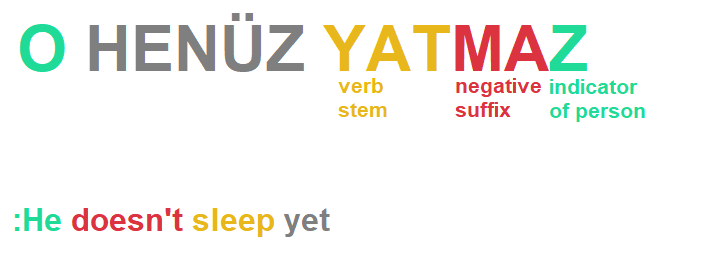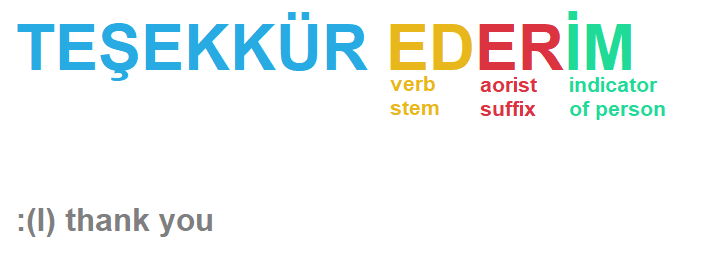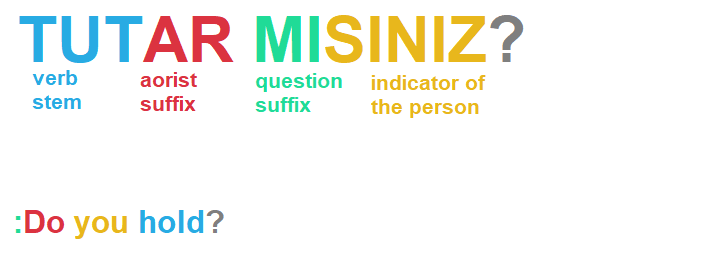Turkish aorist tense and present simple tense of English are roughly the same things. Many sources serve it as they are the same.
They have similarities but aorist is a totally different thing. Anyways, you’ll learn how to use aoist tense (properly) at the end of this section.
Okay, let’s talk about the Aorist a bit.
Aorist is a grammatical phenomena that you don’t see in every languages’ grammar. However, you can also see it in Ancient Greek. Turkish of aorist tense is Geniş Zaman which literally means ‘broad tense‘.
Aorist literally means indefinite or limitless in Greek language. (aóristos) Actually, you already know a word that has the same root of Aorist: Horizon. Horizon draws the boundary of earth and sky. Conversely, it means limited, definite.
But don’t hurry to think that Greek and Turkish aorist are the same things. In fact, the aorist of Greek has nothing to do with the Turkish aorist. You may have difficulties why they are called the same.
What’s the function of Turkish aorist tense in the language?
It is used to describe continuing or habitual activities. (maybe you can relate being limitless, indefinite?)
So, next time when you see Aorist Tense, what should you understand?
Habitual things!
English present simple tense also has the same aspect. But Turkish aorist tense takes this a step further. Let’s see that with an example. (If you have studied Turkish present continuous tense -(I)yor, you’ll recognize the example.)
How do you say ‘I love you’ in Turkish?
Seni seviyorum.
Yes, it’s literally ‘I am loving you’ but it means ‘I love you’. If we form it with Turkish simple present (as English does) it becomes: Seni severim.
But ‘seni severim’ doesn’t mean ‘I love you’ of English. Because ‘seni severim’ is this:
I love you Because I usually fall in love with the girls/boys like you. Because you are my type. It’s habitual.
I hope it is more clear now.
How to form Aorist tense:
Aorist Tense suffix is “-r”. So you add -(I)r or -(A)r to the verb stem.

If verb stem ends with a vowel, then you simply add –r. But if the verb stem ends with a consonant then you are going to choose one of –(I)r or –(A)r. (Vowel harmony)
RULE 1: If the verb stem is only one syllable: -(A)r
RULE 2: If the verb stem is longer: -(I)r
SINGULAR
| Ben | Sen | O | |
| VERB+ | (i)rim | (i)rsin | (i)r |
| oku- | okurum | okursun | okur |
| kal- | kalırım | kalırsın | kalır |
| iç- | içerim | içersin | içer |
Since ‘O-ku’ is two syllable, you add (I)r.

Turkish Aorist Example
Yatmadan önce dişlerimi fırçalarım
I brush my teeth before going to sleep
‘Fırçala-’ is the verb stem. (‘Fırça’ means ‘brush’ and ‘Fırçala’, to brush.) So, since the verb stem ends with a vowel, then you only add –r.
Bira içmeyi pek severim. Genelde arkadaşlarımla içerim
I like drinking beer. Generally, I drink with my friends (as if it is a ritual)
‘sev-‘ and ‘iç-‘ are one syllable stems. So, you add –(A)r.
Okur
Literate
Turkish Aorist Negative
Negative aorist is formed differently. Negative suffix comes into the picture! –me.
NEGATIVE
| Ben | Sen | O | |
| VERB+ | mem | mezsin | mez |
| oku- | okumam | okumazsın | okumaz |
| kal- | kalmam | kalmazsın | kalmaz |
| iç- | içmem | içmezsin | içmez |
Turkish Aorist Negative Examples
Asla ıspanak yemez
S/he/it never eats spinach
Ekmeden biçilmez (figurative expression)
(Without planting) If you don’t plant, you can’t harvest
illiterate
okuma yazma bilmez (someone who doesn’t know reading / writing), okumamış

PLURAL
| Biz | Siz | Onlar | |
| VERB+ | -(i)riz | -(i)rsiniz | -(i)rler |
| oku- | okuruz | okursunuz | okurlar |
| kal- | kalırız | kalırsınız | kalırlar |
| iç- | içeriz | içersiniz | içerler |
Turkish Aorist Tense Example
Yazları bahçede uyurlar
They sleep in the garden in summers
Her buluşmamızda bu restorana gideriz
We go to this restaurant in every meeting
Her ay bir kez şerbet* içerler
They drink şerbet each month
Bu kitabı iki günde okuruz
We would read this book in two days
Şerbet: Şerbet is a west Asian drink that is made of different fruits. It is sweet and chilling to drink usually served in hot summer days. In Ottoman era, it was very common and today you could find it in the ‘old Istanbul city’, Fatih.
NEGATIVE
| Biz | Siz | Onlar | |
| VERB+ | -meyiz | -mezsiniz | -mezler |
| oku- | okumayız | okumazsınız | okumazlar |
| kal- | kalmayız | kalmazsınız | kalmazlar |
| iç- | içmeyiz | içmezsiniz | içmezler |
Turkish Aorist Example
Geç kalmayız
We don’t be late
Bu öğrenciler asla kalın kitap okumazlar
These students never read thick books
dönmek
to turn, to rotate
döner (here, the verb is made a noun by aorist)
döner, he/she/it rotates, the thing that rotates
Kitap okuyorum
I read book, I am reading book
Kitap okurum
I read book (everyday, before going to sleep, weekends etc.)
Karanlıktan korkarım
I am scared of dark
Be Polite with the Aorist!
The aorist is also used when requesting something in a polite way.
Bıçak getirir misiniz?
Could you bring a knife?
Kapıyı kapatır mısın?
Could you close the door?
Kapıyı kapatıyor musun?
Are you closing the door (or what?)
Kapıyı kapatıcak mısın?
Are you going to close the door?
For instance, “rica ederim” or “teşekkür ederim” are formed using aorist.

When narrating a story or describing an action happened in the past, the aorist is used.
Küçük kız ninesine kurabiye götürürken, bir kurt görür.
When little girl taking cookies to her grandmother, she sees a wolf
Aorist Past Tense
Past of Aorist is translated as ‘used to’ in Turkish. The negative of it ‘mezdim’ is translated as I used not to or I would not. Let’s see the conjugations of aorist past tense together:
SINGULAR
| Ben | Sen | O | |
| VERB+ | -rdim | -rdin | -rdi |
| oku- | okurdum | okurdun | okurdu |
| kal- | kalırdım | kalırdın | kalırdı |
| iç- | içerdim | içerdin | içerdi |
Past Tense Example
Ben içerdim.
Sen içerdin.
O içerdi.
Taşınmadan önce her hafta sushi yerdim
Before moving, I used to eat sushi every week
Karnım acıkınca, annem bana yemek pişirirdi
When I got hungry, my mom used to cook for me
90larda hep pop dinlerdin, şimdi elektronik müzik dinliyorsun
You used to listen to Pop in the 90s, but now you are listening to electronic music
PLURAL
| Biz | Siz | Onlar | |
| VERB+ | -rdik | -rdiniz | -rdiler |
| oku- | okurduk | okurdunuz | okurdular |
| kal- | kalırdık | kalırdınız | kalırdılar |
| iç- | içerdik | içerdiniz | içerdiler |
Past Tense Example
Biz içerdik.
Siz içerdiniz.
Onlar içerdiler.
Akşamları eve geç gelirdiniz
You used to come home late
Kafa
Head
Kafaya takmak
lit. to attach, bother
to Care
Bunları kafanıza takmazdınız
You(pl) used not to care these
Okay, let’s review again for which situations you must use the Turkish aorist tense. So that you reinforce your knowledge.
1.Habitual Things
2.Idioms and Proverbs
A Turkish proverb:
Kirpi yavrusunu pamuğum diye sever.
A hedgehog strokes her child saying, my cotton.
3.Polite requests
Teşekkür ederim
Thank you
Rice ederim
You’re welcome
4.Future plans
To describe a future plan that is not planned, you use aorist. Let’s see with an example:
Belki yarın gelirim.
Maybe I’ll come tomorrow. (You are not sure!)
Interrogative of Aorist (Question Form of Aorist)
Okay, if it is clear so far: there is one thing left: QUESTION FORM!
The meaning in the question form of the aorist changes a little bit. It’s best translation into English is “would”.
Question form of Aorist (Interrogative of Aorist) is pretty simple and regular. Of course our “question suffix” m(I), comes into the picture: mı, mu, mü, mi
Choose one of them according to the vowel harmony and add to aorist! Don’t forget to write the question suffix separately!
But why do you have to write question suffix (mi) separately?
Think about it… (the answer is at the end)
Yapar mıyım?
Would I do? or Do I do?
Yapar mıydım?
(how) Would I have done that?
Second one is the past aorist.
SINGULAR
| Ben | Sen | O | |
| VERB+ | -(ı)r mıyım? | -(ı)r mısın? | -(ı)r mı? |
| oku- | okur muyum? | okur musun? | okur mu? |
| kal- | kalır mıyım? | kalır mısın? | kalır mı? |
| iç- | içer miyim? | içer misin? | içer mi? |
Turkish Present Tense Example:
Ben içer miyim?
Sen içer misin?
O içer mi?
(Ben) Sever miyim?
Would I like it?
Bilmiyorum, gider mi.
I don’t know if s/he’ll go.
Here, you see a tiny irregularity for the third-person-plural. According to the pattern, it must be ‘(ı)r mılar‘ to be attached yet it is ‘(I)rlar mı?‘
PLURAL
| Biz | Siz | Onlar | |
| VERB+ | -(ı)r mıyız? | -(ı)r mısınız? | -(ı)r lar mı |
| oku- | okur muyuz? | okur musunuz? | okurlar mı? |
| kal- | kalır mıyız? | kalır mısınız? | kalırlar mı? |
| iç- | içer miyiz? | içer misiniz? | içerler mi? |
Turkish Present Tense Example:
Biz içer miyiz?
Siz içer misiniz?
Onlar içerler mi?
Rus edebiyatı okur musunuz?
Do you read Russian literature?
Biz hiç bunu yapar mıyız!
Would we ever do that!

You see the interrogative of aorist in present tense. The past tense has a very similar pattern too. When you want to form interrogative of aorist in past, you’d simply add -di after the question suffix -mi.
Don’t forget that interrogative suffix (mi) is ALWAYS written separately. Okay, let’s come to the reason.
Why interrogative suffix -mi is written seperately in Turkish?
Because if it is written together, you could confuse the question suffix (mi) with the accusative form of possessive suffix.
How?
Kızımı getiriyoruz doğum günü partisine.
We are bringing my girl (daughter) to the birthday party.
Kızı mı getiriyoruz doğum günü partisine?
Are we bringing the girl to the birthday party?
Of course, you can understand by the tonation but when you are reading written Turkish, it is confusing. Writing the question suffix separately is a good solution.
I hope it makes sense now.